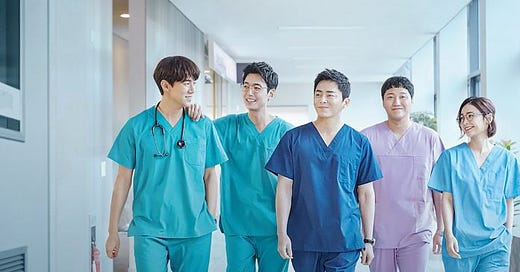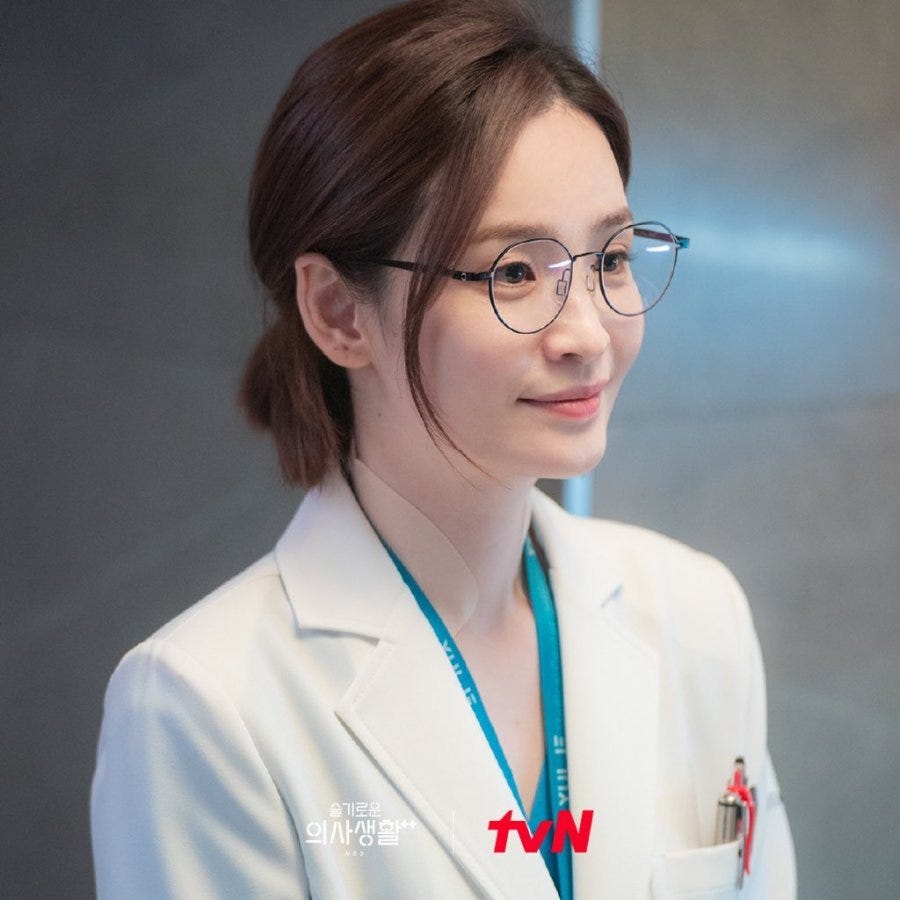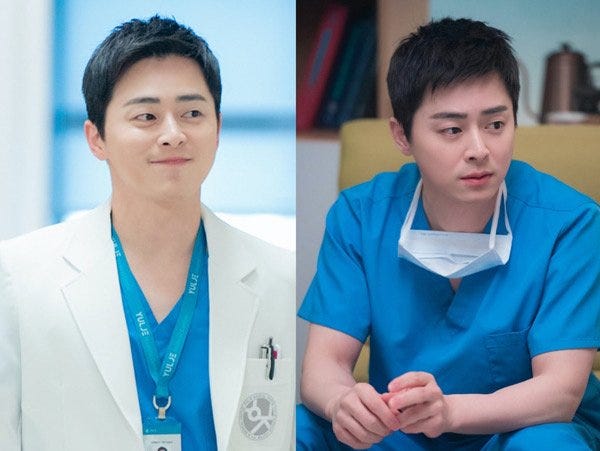Mentoring is a brain to pick, an ear to listen, and a push in the right direction.
Lessons from the "Hospital Playlist" Drama
The word “mentor” originated from a Greek mythology where Odysseus, the king of Ithica left his son under the care of a guardian named Mentor, whose job it was to protect and guide him. Unfortunately, in medicine within our local culture, many have lost sight of what mentoring truly is and is therefore often taken for granted or seen as a burden. As I began my own journey as Programme Director within my residency programme, I was blessed to realise early on that relationships are the building blocks for any programme to be successful, especially the mentor-mentee relationships that are often neglected.
Hospital Playlist is a South Korean television series that tells the stories of five doctors who have been friends since medical school. Despite coming from different backgrounds, working in different specialties, and having vastly different personalities, one common thread ran through their lives, which was their care for their patients and the trainees that worked under them. As I watched the show, I could not help but reflect on my own mentoring relationships I had. Why were some of my own interactions with my trainees so superficial and devoid of meaning? If mentoring was meant to be rewarding as some have described it to be, what was missing in my approach? And as I observed how mentoring was done around me, I couldn’t help but notice a recurrent theme - we were not really mentoring our trainees, we were coaching them for compliance. We mentor by instructing mentees to attain to standards which we have defined as our goal, and as such, always see the problem and not the person. Andrew Carnegie, who in the late 1800s was the wealthiest man in the US and mentored many individuals, once said “Men are developed the same way as gold is mined. One doesn’t go into the mine looking for dirt. One goes in looking for gold.”
Although the show was purely fictional, it highlighted attributes of mentors that I now hope to aspire towards, and those attributes are beautifully put together in this quote, “Mentoring is a brain to pick, an ear to listen, and a push in the right direction.”
A brain to pick
Our mentees consciously and unconsciously learn from us, from the words we say during ward rounds and mortality/morbidity meetings, or how we conduct ourselves in front of our patients and colleagues. In a sense, we are constantly being evaluated, and it is the hypocrisy of us not doing what we say we ought to do that destroys developmental growth.
The show is filled with examples of mentors setting very high standards for their mentees, whether it be in professionalism, communication with patients, or even the practice of lifelong learning. Jun Wan, a cardiothoracic surgeon consultant with a nasty exterior facade that hides a caring and dedicated spirit, was taking consent for a endocarditis vegetation surgery on an elderly patient. The patient’s daughter was going to get married on the day of the surgery, and out of guilt, she kept asking Jun Wan if her father would be safe during the surgery. He replied curtly to them that all procedures have risks and that he could not guarantee such things. Of course, the patient’s family was upset, and his mentee later challenged Jun Wan on his attitude towards them, and asked why he couldn’t just reassure them for the sake of the wedding. Jun Wan retorted “How does feelings help surgery? I’ll be emotional if it helps me with the surgery, but it doesn’t. So never say to them not to worry about anything, because you are not being fair to the patient.” Mentors are not perfect, and often our mentees do shape us to be better people and better doctors too. This bidirectional sharpening of Jun Wan with his mentee was evident throughout the show, where as his mentee softened his approach to patients, the mentee also learnt what it meant to be a consummate professional who always wanted the best for his patients.
Song Hwa, a strong-willed neurosurgeon, whose industry at work was only matched by her care for her patients, brings her mentee for coffee late at night in the hospital after grilling him for his inability to perform an External Ventricular Drain surgery well. She apologises to him first for the manner in which she grilled him but she then explained why she did it. “One should not get too comfortable even if you have done a lot of such procedures. You have to always be in your toes to deliver the best care to your patients, and I push you to ensure that you always do so.” The show had many such scenes of consultants practicing direct observation with timely, constructive feedback on their mentees, unlike some of the third party one-sided feedback that we are accustomed of receiving and acting upon. Feedback has to be constructive, and neither sugar-coated, nor laced with personal attacks. Expecting high standards of your mentee is actually a sign of respect to that individual, and as the show revealed, there are many ways of doing this without destroying the morale of the other person.
An ear to listen
Mentees must believe you want to help them. How? Ask good questions, listen intentionally and explore what’s important to that person. Great questions can lead to great conversations and more importantly, these questions have to originate from a genuine curiosity of the person. Often, a lack of understanding of the context of who that person is and their unique journey causes us to misunderstand their actions. Knowing them also helps us reorient their growth to their natural strengths
Ik Jun, a hepatobiliary surgeon, a powerball of enthusiasm and energy that brings life to wherever he is at, repeatedly demonstrates in the show the practice of the attributes described above. Before an intern in his department introduces himself, Ik Jun has already known everything about him, from his age, hometown, to even what medical school he was from. And he did it mainly because he values people above all other things. Throughout the show, he is also always seen being the sounding board for his colleagues and mentees, often helping them explore solutions and spotting opportunities for their growth.
Having genuine care for your mentees often allows us to observe situations where acting proactively would have far greater benefits, than reacting when it actually happens. Seok Hyeong, an obstetrician who is a sociophobe, and who despite his social difficulties, never fails to show concern for his patients and his mentees. One of his mentees was doing multiple night calls due to recurrent disappearances by a colleague of hers. Though he didn’t say much to her, he had observed from a distance and recognised that she was close to burnout. He therefore arranged takeaway meals for her to be delivered in secret, and refused to let her know about what he did as he felt that her bitching about him would help her de-stress and be less burnt out.
Like them, we need to learn to genuinely care for our mentees and through proactive observation, make sense of what is happening to them. When we spend time talking to them, we need to give them our undivided attention, and this is one thing I’ve also learnt in managing my patients in the SGH Functional GI Disorders clinic. My practice of not touching my computer while my patient is in the room has helped me become an intentional and undistracted listener, to fully appreciate the qualities of the individual and the context of their presentation. This is something I hope to do more of, as I grow into my role as a mentor.
A push in the right direction
Many of us are good at instructing but less in inspiring our mentees to be the best version of themselves, whether it is through building confidence or embracing failure as a catalyst for future success. When our mentees do not change after our instruction, we are quick to blame it on their reticience or apathy, but often, we too are part of the problem as mentors.
A powerful scene in the show involved Song Hwa and her mentee during a transphenoidal removal of a pituitary tumour. The mentee had rushed the informed consent process and was rude to the patient, as Song Hwa observed in a distance. Prior to the surgery, she told him bluntly that she would not let him scrub in until he apologised to the patient. And when later she found out that he had treated the patient like an academic subject rather than a person, she threatened him “if I ever catch you treating any of my patients like that, I will never let you step into theatre with me again.” The mentee changed in his behaviour, not because of the threats, but from a genuine repentance of realising the wrong he did. But what led him to that conclusion? It was a combination of the consistent high standards Song Hwa had always set for the care of patients, as well as conviction that she always had his interest at heart too, and this was built from the trusting relationship he had with her.
As mentors, we ought to guide our mentees towards an honest and accurate assessment of themselves, and challenge them to think what their ideal self should be, and then move towards that. When we coach for compliance, we try to fix what we think is wrong and get them to do what we feel they ought to do. But as mentioned, often they don’t change or the change is not sustainable.
Final thoughts
I have to be a better mentor, and this awareness is probably the right place to start. Of course the show is just a show, and the circumstances within the show are exaggerated for entertainment, but some of the attributes of mentors within the show are easily generalisable to our local context. Mentoring requires a change in our mindset that may not be as intuitive to use as we would like it to be. It requires us to put the welfare and growth of our mentees as our goal. This takes us out of our comfort zone where we can rely on transmission of knowledge and skills as educators. I can’t help but draw similarities again to the patients I manage in SGH Functional GI clinic. Sometimes putting any medical expertise aside and interacting with the patient as a fellow human being, allows me to explore individualised solutions to the medical problem that I would otherwise not thought of.
Maybe the next step then for all of us is to have genuine care for our mentees. We cannot expect to meet them every few months and then expect them to listen and change just because we say so. When we discuss their work performance within the scope of their life, and not work being their life, only then can we truly mentor them better. No alcoholic changed and continued to change solely because of willpower or because someone told them to change. It is always driven by a bigger purpose of how they view their life, which was often assisted by others.
I appreciate that some of the readers are mentees still, but you will all inevitably be a mentor one day, and spend a greater part of your career in a mentoring role, rather than being a mentee. We must make mentoring an essential element of our work so that we can invest the appropriate time, energy and resources to it. Mentoring is a skill that should be practiced like any other skill, and accompanied by self-reflection that involves questioning how we can be more effective in that role along a commitment to self-improvement. It is something we cannot measure tangibly; yet mentoring is a privilege to build reciprocal relationships with fellow colleagues that can be life-changing for both. At the end of our careers, it is likely that what truly matters to us would be the individuals that one is able to guide, to become better people and better doctors.
Andrew is a Gastroenterologist in Singapore General Hospital and the Programme Director of the Singhealth Gastroenterology Residency Program. He is a husband, a father, a basketballer, a boardgamer and a lover of coffee. He hopes to add mentor into that list of things that define him one day.
This article first appeared in the SingHealth Division of Medicine Medical Humanities Newsletter Volume 2, Issue 1.







